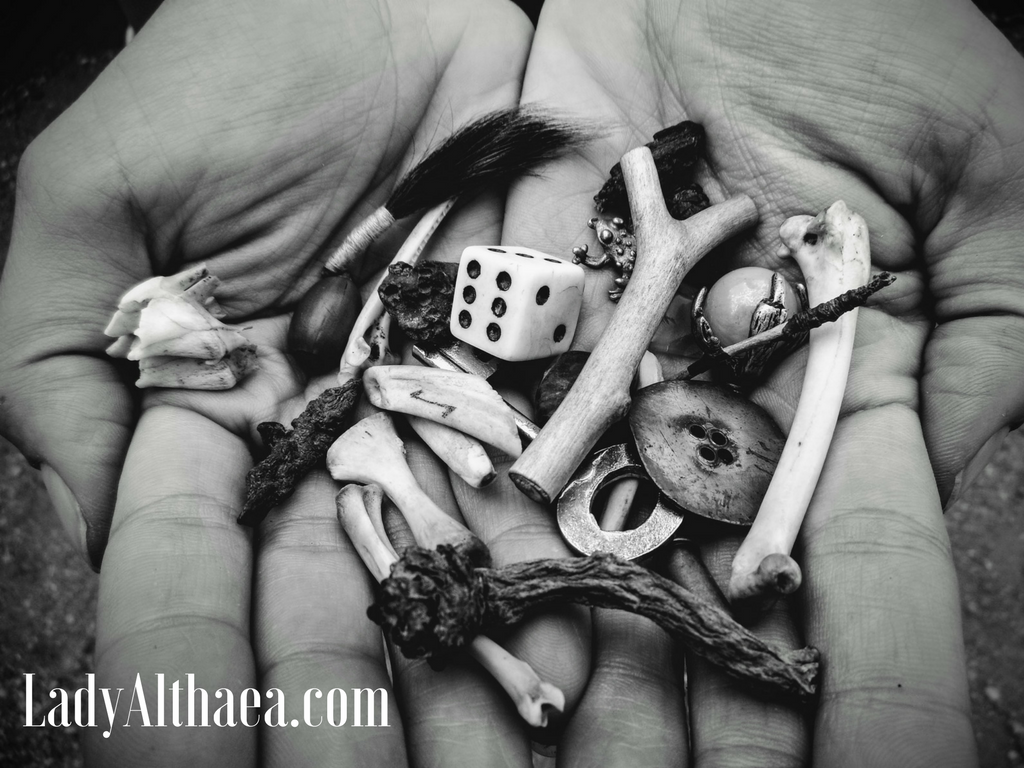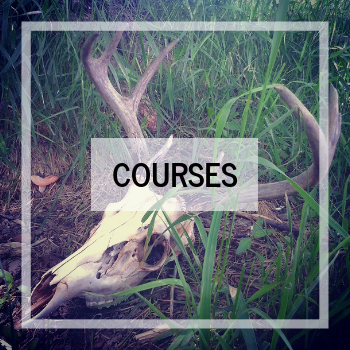|
Divination is a means of analyzing a situation in order to gain clarity and insight through random variables. With some forms of divination, such as using cards, throwing bones, or scattering herbs upon water, those random variables come together to present a sort of snapshot of the currents of energy surrounding the focus of the reading. But with all divination methods, those random variables serve as a means for us to engage our psychic senses, either by intuiting the messages and insights based upon the subconscious triggers or by applying a systematic approach to analyze the random variables, using intuition to decipher which of many set meanings (per that system) is correct. Regardless of the specific method used, divination is a means for us to tap into and make sense of the currents of energy at work in our lives, to better understand our internal motivation and reluctance, and to identify external factors that influence our choices. The information that we gain is used to provide us with a broader and more objective view of a situation, issue, or even person so that we can make better-informed decisions that enable us to more effectively reach our goals. How is Divination Useful in Witchcraft?Although divination is not in itself witchcraft, it is one of the five defining traits of witchcraft that distinguish it from other magickal systems. Note that there is no one specific form of divination that is a requirement to be a witch: you do not ever have to learn to read Tarot to be a witch (and certainly not to be Pagan, nor do you need to learn any form of divination, but I digress...) And there is most definitely not any one specific form of divination that is more witchy or traditional or authentic or whatever the current buzz word is that implies greater power and credibility. It is the use of divination that is a defining part of witchcraft, not the divination method you use. While other magickal systems focus heavily on the individual changing themselves in order to align with godhead, witchcraft is focused more on the ways that the individual can make changes within their everyday life. In using divination to analyze a current situation in our lives, we can see the areas that are most easily changed, the areas where consistent work will be required to make changes, and the ways that we are causing problems for ourselves. This provides us a starting point and a map when planning spells and other acts of magick to change the situation from what it is to what we want it to be. From there, divination can be used to identify if what is wanted and what is needed are in agreement, what outside factors could affect any spell work, and then to plan the details of that spell work. In addition to using divination to plan a spell, it can also be used afterward to determine if the spell was successful (for when the results are not able to be seen) and if any follow-up work is necessary. This use in planning and follow-up further demonstrates the function of divination as a means of analyzing those energy currents. The reliance on seemingly random variables (from our perspective) also makes divination effective in communicating with spirits. Existing outside of the physical, spirits are better able to influence the subtle and seemingly random. They can work through us to shuffle the cards, to influence the bone throw, or to shape the herbs on the water. They can then whisper to us as we interpret the shapes, patterns, and symbols before us, adding new meanings and adding depth to what we intuit. Of course, divination can also help us with our internal work, exploring the shadowy aspects of ourselves we’d rather ignore, and help us to identify a plan of action for our personal growth. While such may not be a prime focus within witchcraft, it is a part of it as any strengthening of a vessel allows it to hold more and to pass on those contents with less contamination or loss. Blind Spots & LimitationsBut all divination methods are not created equal. Each has its own strengths and brings something different to a reading that another method cannot bring. Each has its own unique way of communicating and way of interacting with our psychic abilities in order to pull forth wisdom, insight, and guidance that we can apply within our everyday lives. Primary Differences Among Divination Methods
Those limitations of a divination method in combination with the limitations of the individual may complement each other -allowing that individual to work around their own limitations due to the divination methods proficiency in that area- while the limitations of another combine with the limitations of the individual only exasperate each other. This is why some people work better with certain divination methods rather than others and why you can have great success with one method and be quite awful with another. The important take away here is that there’s more to divination than Tarot and you can be a fucking phenomenal diviner and never touch Tarot. Benefits of Knowing more than one form of DivinationIt is difficult if not impossible to predict how well you may get along with a particular divination method, whether you bring out the best in each other or whether that method only leaves you disappointed, without jumping in feet first and committing yourself to learning and practicing it. Even so, after years of less than ideal results with a particular divination method, you may find improved success after learning and practicing a different method with which you naturally work more effectively. Regardless of how well a particular divination method works for you, there will still come a time when you find yourself up against a wall and unable to get the insight you need from it. Being proficient in more than one divination modality lets you easily work around this issue, acquire the information you need, and then to act accordingly and make the necessary changes in your life. In seeking to learn another divination method to expand your practice, find a new method to learn that is different from the method you know. This way, the two methods complement each other and better cover the limitations of the other. For example, if you read Tarot, learning to read Lenormand cards or one of the endless number of oracle decks available will not give you that greater breadth of sight -you’re sticking within the same realm of limitations.* There are no criteria for choosing what type of divination may work best for you. This is one of those things where you can only pay attention to the signs: what is your intuition saying, how do you feel when reading about that divination method, is it a method that fits into your lifestyle in a practical way, can you afford to learn that method -be it financially or time-wise, have you developed the prerequisite skills to effectively begin learning that method, et cetera. Like so much of witchcraft, there is no end nor point where you’re suddenly really doing it -there is only the process of doing, of learning and testing yourself, of being changed by the things you learn, the things you experience, and the changes you make in your life. It takes time and effort to develop skill; there is no way around that. So, if you are only mediocre with one divination method and are wondering how the hell you’re supposed to become proficient at two methods, remember that you do so the same as you became proficient at any other skill in your life: you take it day by day, making the time for it and putting in the effort. It’s all in the doing. *Yes, yes, I know that Tarot and Lenormand do not work the same way and do speak in different tones. However, the differences between Tarot and Lenormand are not so great as the differences between both forms of card divination and scrying or runes or throwing the bones.
You can choose a topic for me to write about each month and support my writing, too! For less than the cost of a cup of coffee, you can also get early access to blogs and articles and free copies of all my books.
Comments are closed.
|
Throwing the BonesStay ConnectedThank you!You have successfully subscribed. Archives
January 2023
|






